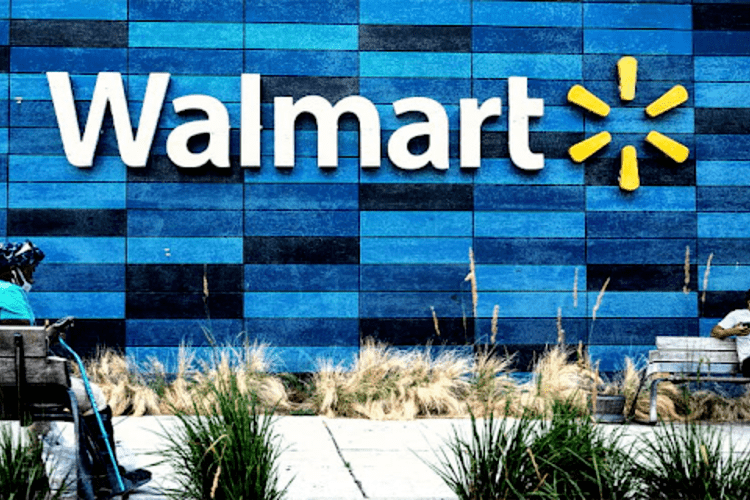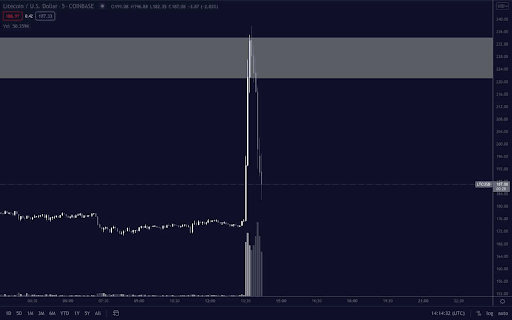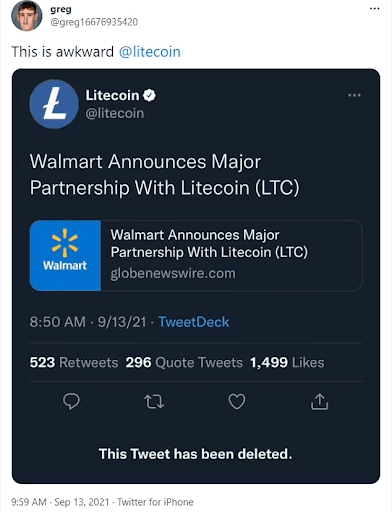Litecoin and Walmart. Why fake news is still flourishing in the market

At the beginning of this week, seemingly inspiring and sensational news hit the crypto market. Several respected publications, including Reuters, Bloomberg, and CNBC, reported that the US retail leader Walmart has entered into an agreement with the Litecoin Foundation and will soon begin accepting payments with the cryptocurrency of the same name.
Another adoption, another success! The market went up, Litecoin itself soaring by 38% within 15 minutes after publication, pulling along with Bitcoin, which grew by almost $ 2,000. However, within an hour, the news was denied first by Walmart and then by Litecoin, which immediately neutralized all LTC achievements.

Figure 1: "Burj Khalifa" - as users called the behavior of LTC on the Monday graph, hinting at its resemblance to the tallest building in the world
Many did not immediately think that this news came from the world of fiction - back in 2019, Walmart announced plans to develop its own digital asset based on the US dollar. And recently, in August, the company was looking for candidates for the position of the head of cryptocurrency products. Walmart needed no less than a specialist capable of developing a development strategy in the field of digital currencies and making the largest retailer the leader in this segment.
Еven the manager responsible for Litecoin’s social networks, stunned by the “achievement” of his company, hastened to retweet the message about the partnership with Walmart in the official account, without bothering to check this information with the higher management.

But on the other hand, no one thought why Walmart bets on Litecoin, which is not even in the top ten in popularity.
The source that was the first to replicate this fake was the GlobeNewswire press release distribution service. Formerly a reputable partner of many companies and operating for 20 years, the service blamed a "fraudulent account" for everything. So does this mean that anyone can distribute "official" statements that may have such a significant impact on the markets on behalf of large companies?
Of course, GlobeNewswire immediately stated that the company has already improved its authentication and verification mechanisms to avoid such information injections in the future.
It is far from uncommon when news about sensational cryptocurrency partnerships with retail chains and other large businesses become a tool for manipulating the rate of certain digital assets. Back in July, it was reported that American IT and e-commerce giant Amazon would accept Bitcoin as a payment instrument from the end of this year. As a result, the world's first cryptocurrency also rushed up, and after a quick refutation from Amazon, it again lost in value.
Obviously, the Walmart and LTC fake was no coincidence. Someone, of course, hit their big jackpot. But the anonymous nature of cryptocurrencies will probably prevent us from getting an answer about who exactly was the beneficiary in this whole mess. Litecoin's founding father, Charlie Lee, is surely above suspicion. Indeed, based on his famous interview with Bloomberg TV, he sold almost all of his assets in LTC, leaving himself only 20 LTC. Let's take his word for it.
It seems that in order to achieve a better balance in the market and to avoid reputation losses, crypto giants and the media should unite in the fight for the "purity" and quality of transmitted information, strengthening the identification and verification of news sources. It is also worth thinking about clearer instructions for companies’ SMM specialists. Working with the accounts of candidates for market leadership does not accept improvisation - this is not Trump's Twitter.
With the ever-growing wave of misinformation and misleading information online, these tasks remain incredibly important and difficult to accomplish. But it must be remembered that the digital asset rates' manipulation based on fake news only strengthens the positions of those who point to the lack of reliability of cryptocurrencies and call for tougher regulation or even a ban.
Image courtesy of: The Crypto Times